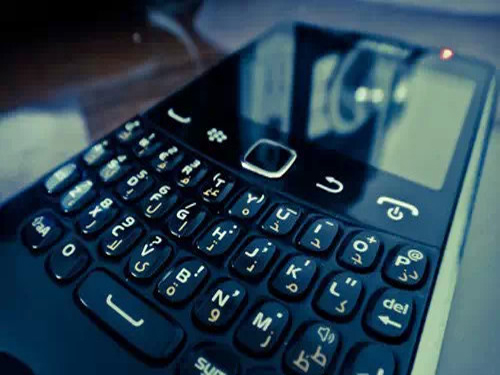For a time, the BlackBerry, popular with European and American politicians and business elites, has recently been reported to be likely to “sell.†According to news last week, Microsoft is making a preliminary assessment of the acquisition of BlackBerry. Another front-selling brand, Palm (Fat Pear), is clear: Its products will no longer be smartphones.
Innosilicon is a worldwide one-stop provider of high-speed mixed signal IPs and ASIC customization with leading market shares in Asian-Pacific market for 10 consecutive years. Its IP has enabled billions of SoC's to enter mass production, covering nodes from 180nm to 5nm across the world`s foundries including: GlobalFoundries, TSMC, Samsung, SMIC, UMC and others. Backed by its 14 years of technical expertise in developing cutting-edge IPs and ASIC products, Innosilicon has assisted our valued partners including AMD, Microchip and Microsoft to name but a few, in realizing their product goals.
Innosilicon Miner:Innosilicon A4+ LTCMaster,Innosilicon A6+ LTCMaster,Innosilicon A6 LTCMaster
Ltcmaster,innosilicon ltcmaster,innosilicon ltc miner,Innosilicon a4,Innosilicon a6 Shenzhen YLHM Technology Co., Ltd. , https://www.apgelectrical.com
Last week, Microsoft, which has acquired Nokia, continued to maintain its "good appetite" in the smart phone field. In order to evaluate the acquisition of BlackBerry, Microsoft has found Deutsche Bank and Goldman Sachs. The acquisition involved an amount between 6 billion and 7 billion U.S. dollars. For this news, Microsoft officials have not yet commented, BlackBerry did not respond to instructions. In fact, the rumors about the acquisition of BlackBerry have long been buzzing. Previously, the scandal was targeted at China's Lenovo. But then Lenovo bought another fallen giant Motorola.
Statistics show that BlackBerry sold only 1.3 million smart phones in FY2015. However, Xiaomi sells up to 60 million mobile phones. Because the market share is too low, according to Gartner, a well-known survey company, this year it will no longer count the BlackBerry BlackBerry OS's market share separately, but will incorporate it into the “Others†column.
In addition, some analysts believe that in view of the fact that the apple and Android camps in the smartphone market have been set in opposition, the BlackBerry is destined to fall into the point of no counterattack. With the increasing popularity of touch screens, BlackBerry's full keyboard that has led the fashion trend has long been eliminated. Previously, the security performance of BlackBerry's pride was defeated by the same highly secure Apple system and various security applications. Therefore, being acquired by Microsoft is actually a good choice, because BlackBerry has no place in the smart phone market.
Mobile phone brand record
In addition to the BlackBerry, a large number of brands with years of unlimited experience have mostly transformed or left the smartphone industry. The remaining winners are rare.
Palm: Transformation
Palm is the king of early intelligent devices. But Palm was acquired by Hewlett-Packard in 2010 and thought it would daunt the industry, but a year later, in 2011, Hewlett-Packard announced that it would cease to operate the WebOS-related mobile device and tablet business. At the 2015 CES show, TCL announced the acquisition of the Palm brand. According to an interview with a reporter in a recent interview with TCL executives, Palm is an innovative brand, so TCL's positioning is for another innovative product, but it will not be a mobile phone.
Alcatel: Into Latin America
Alcatel, another brand acquired by TCL, is considered the perfect marriage. According to TCL, the Alcatel brand ranks second in market share in Latin America. In addition, due to the large number of Alcatel's patents, this has made it possible for her to “trace†her TCL from overseas to avoid a large number of patent disputes.
Nokia: Evaporation
Nokia, which once occupied the majority of smartphones, could not escape the fate of being acquired by Microsoft. The new smart phones launched by Microsoft are not named after the Nokia brand. The Nokia phones still on sale in the market only have 100 yuan-class functional machines. Nokia is still a giant in the communications equipment industry, but it has nothing to do with smartphones.
Motorola: Low tide
Motorola's brand, which accompanied human beings on the moon, was first acquired by Google. In 2014, it was acquired by Chinese manufacturer Lenovo. Lenovo hopes to turn Motorola into a high-end brand. In January 2015, Motorola returned to the Chinese market, but it didn't seem to make too much waves.
Ericsson: Leave
Ericsson and Sony once grouped the "Sony Ericsson" mobile phone brand. For a while, all of Hong Kong Jade Terrace's mobile phone ringtones were "Sony Love" ringtones. Since then, the Sony brand has developed independently and Ericsson has retreated to the field of communications equipment. Like Nokia, Ericsson is no longer associated with mobile phones.
Philips: Mobile phones are difficult
Remember the Philips phone that was on standby for one month? If you can really solve the problem of charging smart phones, it must be a big hit. Unfortunately, although it is very hard, it still can not provide the perfect solution. Although it is still based on battery life, it cannot escape its fate.
Innosilicon team is fully devoted to providing the world's most advanced IP and ASIC technologies, and has achieved stellar results. In 2018, Innosilicon was the first in the world to reach mass production of the performance-leading GDDR6 interface in our cryptographic GPU product. In 2019, Innosilicon announced the availability of the HDMI v2.1 IP supporting 4K/8K displays as well as our 32Gbps SerDes PHY. In 2020, we launched the INNOLINK Chiplet which allows massive amounts of low-latency data to pass seamlessly between smaller chips as if they were all on the same bus. With a wide range of performance leading IP in multiple FinFET processes and 22nm planar processes all entering mass production, Innosilicon's remarkable innovation capabilities have been proven in fields such as: high-performance computing, high-bandwidth memory, encrypted computing, AI cloud computing, and low-power IoT.